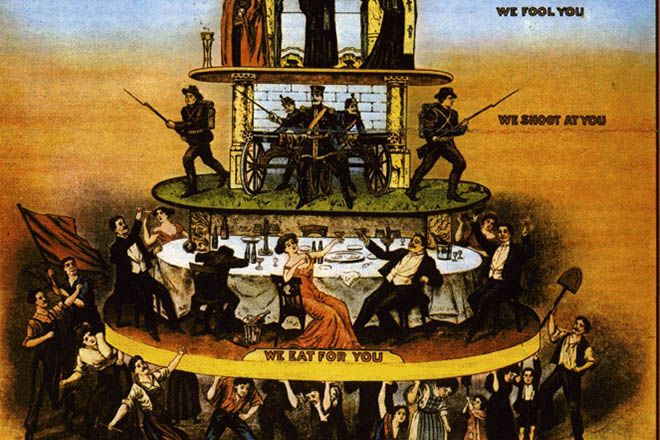Our neolibaralistic society is turning us into psychopaths, witness China´s smogpocalypse with your own eyes, and a visual guide to who hates whom in the Middle East. Read all about it in this Wormfood.
Global News: Are we becoming monsters?
-
Thirty years of Western neoliberalism, free-market forces and privatization have taken their toll, as relentless pressure to achieve has become normative. This short film is a powerful testament to living in harmony rather than in competition with each other and the earth.
-
Our planet has lost 50% of its wildlife in the past 40 years, says WWF. Species across land, rivers and seas decimated as humans kill for food in unsustainable numbers and destroy habitats.
-
A collection of (bad) news about climate change.
-
Climate change is no longer viewed by mainstream scientists as a future threat to our planet and our species. It is a palpable phenomenon that already affects the World.
-
Research into unusually high temperatures across Australia in 2013 found that the peaks would have been almost impossible without the influence of man-made climate change.
-
Postcards from the future show what climate change struck London will look like.
-
Energy & Environment: Chinese smogpocalypse

-
Pollution got so bad in China, a new word is formulated to subscribe it: “smogpocalypse”. See it with your own eyes.
-
Heirs to the Rockefeller family, which made its vast fortune from oil, are to sell investments in fossil fuels and reinvest in renewable energy. "We are quite convinced that if he [oil tycoon John D Rockefeller] were alive today, as an astute businessman looking out to the future, he would be moving out of fossil fuels and investing in clean, renewable energy," the Rockefeller Brothers Fund director said in a statement.
-
These gifs show the sorry state of our oceans.
-
New photos from NASA show that The Aral Sea has almost disappeared. The lake was fed by the Syr Darya and Amu Darya rivers before the Soviet Union diverted them in the 1960s in order to irrigate the arid deserts in Kazhakstan, Turkmenistan, and Uzbekistan. Since then, the lake has almost completely dried up, which spells disaster for communities that depend on it, and the water has become too salty and polluted to support native fish populations.
Business & Economy: Supermarket powered by waste

-
UK supermarket giant Sainsbury’s has now created the first outlet in the country to be powered solely through organic waste.
-
Rapid solar power growth is threatening the financial stability of America's electric utilities. As rooftop solar becomes more popular, people will buy less and less electricity from their local power company. But utilities still have plenty of fixed costs for things like maintaining the grid. So, in response, those utilities will eventually have to raise rates on everyone else. Trouble is, those higher electricity rates could spur even more people to install their own solar rooftop panels to save money. New pricing schemes are developed that do take into account the usage of the electric utilities by solar power.
-
IKEA will expand the sale of solar-panel systems to eight countries after nearly a year of selling them in the U.K. The Swedish home-furnishings company said Monday it will roll out the new products in the Netherlands next month, and in Switzerland later this year.
Science, Technology & Design: Robot swarm

-
Scientists program largest swarm of robots ever. “It’s really a big accomplishment,” said roboticist Hod Lipson of Cornell University, who wasn’t involved in the work. “It’s the first demonstration of this swarm robotic behavior at the scale of 1,000 physical robots.”
-
The U.S. military started The Restoring Active Memory (RAM) program. The aim is to develop brain implants to restore memory to veterans who have suffered brain injuries.
-
The World's first commercial rooftop aquaponics farm is located in Basel, Switzerland. Costing $900,000 to build, it occupies just 26 m² and has been operating since winter 2012. It is capable of producing 5000 kg of vegetables and 500 kg of fish per year.
Urban Environment: Uruguay's radical president

-
We can all learn something from Uruguay’s radical president José Mujica. He is a groundbreaking social liberal, who has introduced the World’s most innovative cannabis legislation as well as gay marriage and legal abortion. Mostly, though, he is famous for the way he lives. He drives a 25-year-old Volkswagen Beetle, lives in a tiny house on a rural smallholding, and gives away 90% of his salary.
-
Would an hourglass traffic light work better?
Unexpected and Intriguing: The secret life of face mites

-
Are mites having sex on my face?
-
Iceland announces men-only conference on gender equality.
-
Kim Jong-un in pictures: The bizarre photo shoots of North Korea's leader.
-
Corporations aren't recruiting enough weirdos.
-
A visual guide to who hates whom in the Middle East.
-
A deep web service will leak your documents if the government murders you.
Special Announcement: New newsletter!
Every couple of weeks you receive a brand new Wormfood in your mailbox. We are nearing our first lustrum for this global news digest, it has been five years already.
On the subject of news digests, we are currently working on a new structure for the Except Newsletter. We will dedicate the newsletter to specific themes, such as food security or natural capital, and publish it every two months. Due to the increased frequency of the newsletter, we decided to decrease the frequency of the Wormfood to a monthly.
However, there is no need to worry. If you subscribe to the newsletter you can still enjoy articles, written by Exceptionals and concerning sustainability on a very regular basis.
If you come across news items suited for the Wormfood, or a theme you would like to see a newsletter being dedicated to, please let me know and we'll do our best to make some magic happen.
Oct. 1, 2014

